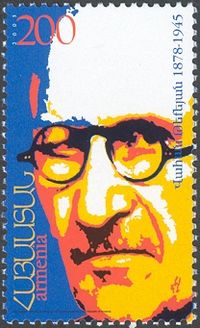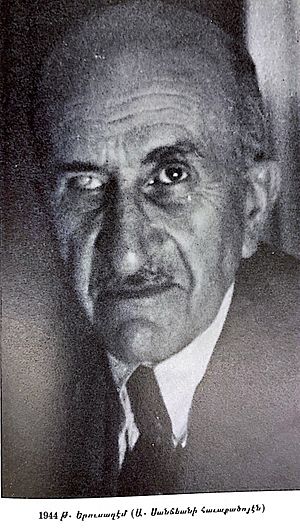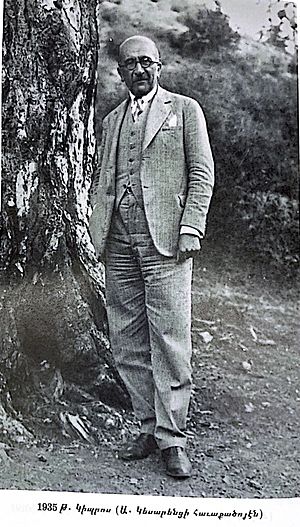Vahan Tekeyan facts for kids
Quick facts for kids
Vahan Tekeyan
Վահան Թէքէեան |
|
|---|---|

Vahan Tekeyan, armenian stamp (2003)
|
|
| Born | January 21, 1878. Constantinople, Ottoman Empire |
| Died | April 4, 1945 (aged 67) Cairo, Egypt |
| Occupation | poet and public activist |
| Nationality | Armenian |
| Notable works | "The Armenian Cathedral", "A Prayer Before the Future", "Your Memory Tonight", "When the Day Finally Comes", and "Your Name" |
|
|
|
Vahan Tekeyan (Armenian: Վահան Թէքէեան) was an important Armenian poet and activist. He was born in Constantinople (now Istanbul, Turkey) on January 21, 1878. He passed away in Cairo, Egypt, on April 4, 1945. During his life, he was the most famous poet among Armenians living outside their homeland. He is still a strong symbol of Armenian identity and culture.
Early Life and School
Vahan Tekeyan was born in the Ortaköy area of Constantinople. He went to primary school there. Later, he attended other schools like the Nersisyan School, the Berberian School, and Getronagan Armenian High School.
Tekeyan's Career
Starting in 1896, Tekeyan worked as a trading official. This job made him travel a lot around Europe. He also worked as a newspaper editor in Beirut and later in Cairo. Besides that, he was a teacher and got involved in politics and social causes.
He also began to write and publish his own poems. His first book of poems, called The Wonders, came out in Paris in 1901. From Cairo, he often wrote for Armenian magazines in the West. In 1905, he started his own magazine, Shirak. This magazine published the works of many Armenian writers living outside their home country.
After the ruler of the Ottoman Empire, Abdul Hamid II, lost power in 1909, Tekeyan moved from Cairo to Constantinople. There, he kept publishing Shirak and became a well-known public figure. When World War I began in 1914, Tekeyan was in Egypt. This allowed him to avoid the terrible events of the war.
Eventually, he returned to Constantinople. He edited a newspaper called Voice of the People. Then, he became the director of the Central School. Political problems in Constantinople later forced him to go back to Egypt. He edited the daily newspaper Arev there until he died.
Some of Tekeyan's famous poems include: The Armenian Church, A Prayer on the Eve of Tomorrow, Your Memory Tonight, When the Day Finally Comes, and Your Name.
His later poetry collections include The Wonderful Renaissance (1914), Midnight to the Dawn (1919), Love (1933), Hayerghutyun (1943), and Tagharan (1944). He also translated works by famous writers like Shakespeare, Victor Hugo, and Oscar Wilde into Armenian.
He passed away in 1945 in Cairo. He is buried in the Armenian cemetery there.
His Lasting Impact
In Armenian literature, Vahan Tekeyan is known as the "Prince of Armenian Poetry." His poems, especially his sonnets, are considered masterpieces. Tekeyan's poems often focused on different kinds of love. This included caring love, love for one's homeland, and love for all people.
Another Armenian writer, Vahe Vahian, was greatly inspired by Vahan Tekeyan's work. Vahe Vahian even chose his pen name because of Tekeyan.
Tekeyan's complete works were published in nine books in Cairo between 1949 and 1950. Collections of his best works were released in Beirut in 1954 and in Yerevan in 1970. A collection of his letters was published in Los Angeles in 1983.
The Tekeyan Cultural Association was founded in Beirut in 1947. It is a very important organization for Armenians living outside their homeland. Today, it has branches all over the world.
Books by Tekeyan
- Sacred wrath: The selected poems, translated by Marzbed Margossian and Diana Der Hovanessian, New York, 1982, 76 p.; ISBN: 0935102086.



